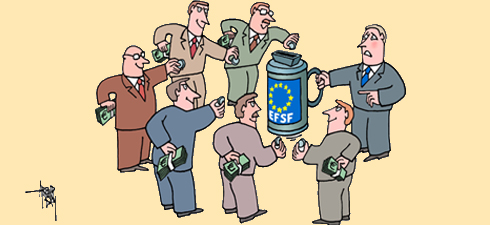Since the great financial crisis started several years back with the bankruptcy of the relatively small Lehman Brothers Bank, politicians have been living in fear: fear of an enemy they do not know and whose rules they are not familiar with. Since the crisis began, they’ve been trying to understand those rules that the banks, the hedge funds, the stock markets and the speculators play by. But not just that. Ever since the start of the crisis they’ve been trying to beat the banks and markets with their own weapons.
That’s how the disaster got underway. Not that there hadn’t been similar crises before, like the tulip bubble in the 16th Century, when the speculation in perishable bulbs ruined a whole nation. In the Middle Ages, countries went bankrupt, and dynasties – the Welsers, the Fuggers, the Medicis – gave themselves up to the big banks. In the 1930s the Great Depression unleashed destructive forces around the world. In 2011, we do not know yet where the financial crisis is leading us.
**This content has been removed under request of the copyright owner.**
Opinion
A pact with the Devil
In strengthening the European Financial Stability Fund “Europe is about to sign a pact with the Devil” – that is, with financial institutions – which is “beyond the law,” writes Slovak financial analyst Valér Demjan in Hospodárske noviny. “The time for rational solutions (the collapse of Greece in 2010) has passed, and the unsystemic approaches by Brussels will make the crash all the harder."
The EFSF, which is only a solution to gain time and calm the markets, will not be enough to stabilise the situation. Nor will the European Stability Mechanism (ESM), which will probably be brought in next year instead of in 2013. For the markets are not satisfied with the guarantees and want to see some real resources up front, represented by an expanded EFSF.
For the analyst, it’s time to start on “aggressive structural reforms” – i.e. to let certain unreliable eurozone members leave and let some banks go bankrupt. Demjan also criticises the attitude of central banks, which “must stop printing money without limit.... History is full of examples that show that printing money never helped solve the problems of debt.” If, in addition, rating agencies lower their rating of France, Germany will be reluctant to fund the entire rescue system, he concludes.
Was this article useful? If so we are delighted!
It is freely available because we believe that the right to free and independent information is essential for democracy. But this right is not guaranteed forever, and independence comes at a cost. We need your support in order to continue publishing independent, multilingual news for all Europeans.
Discover our subscription offers and their exclusive benefits and become a member of our community now!












